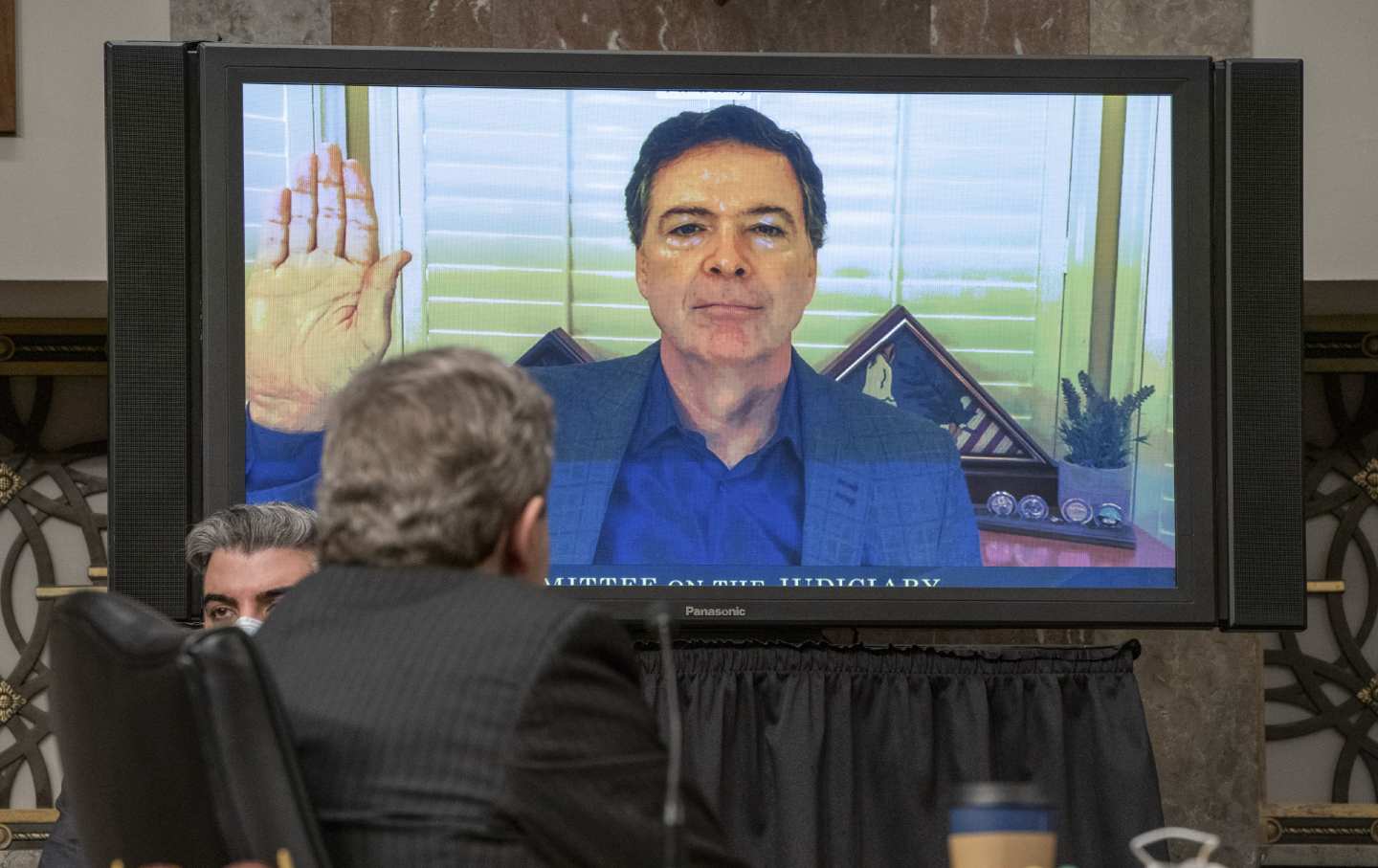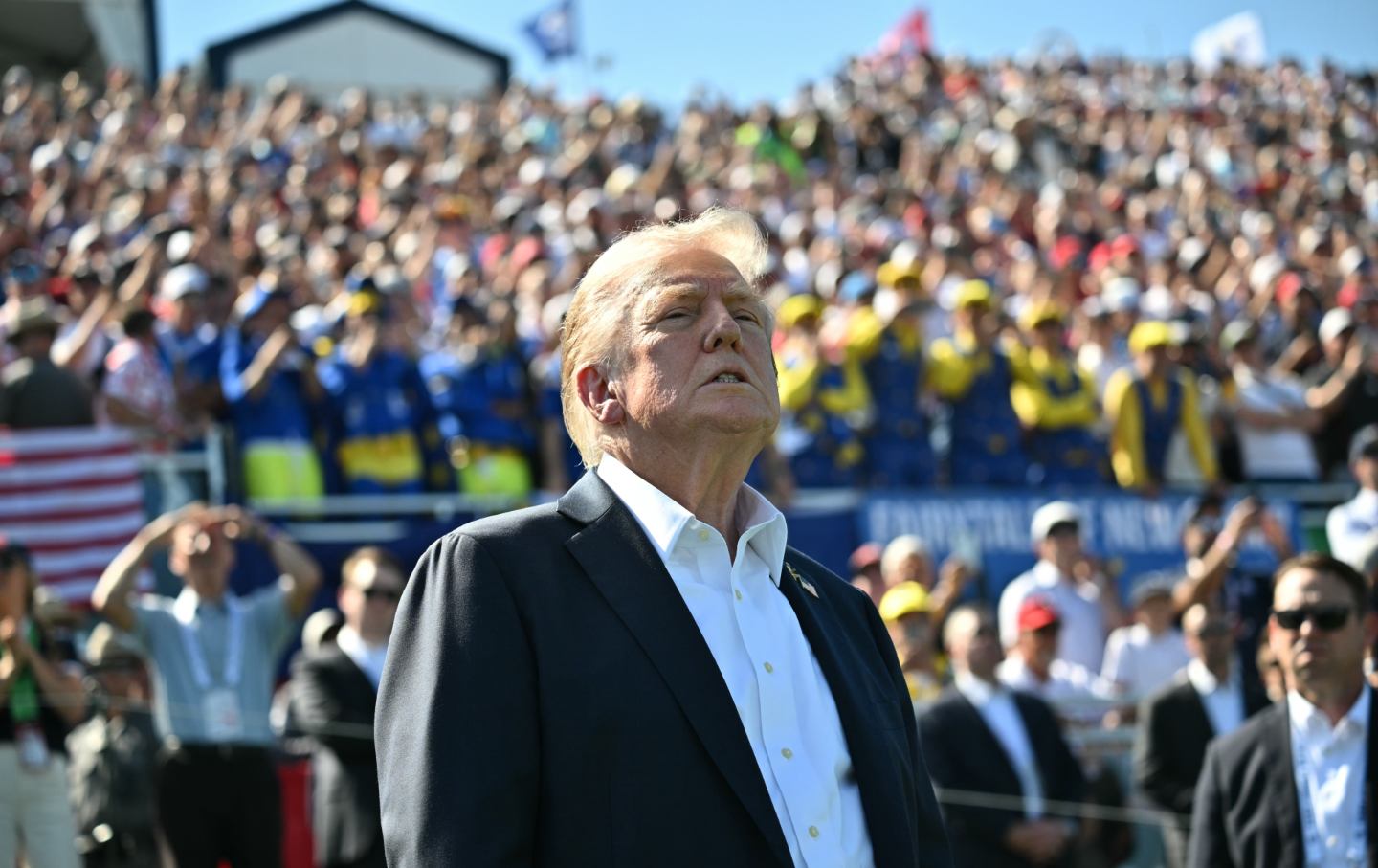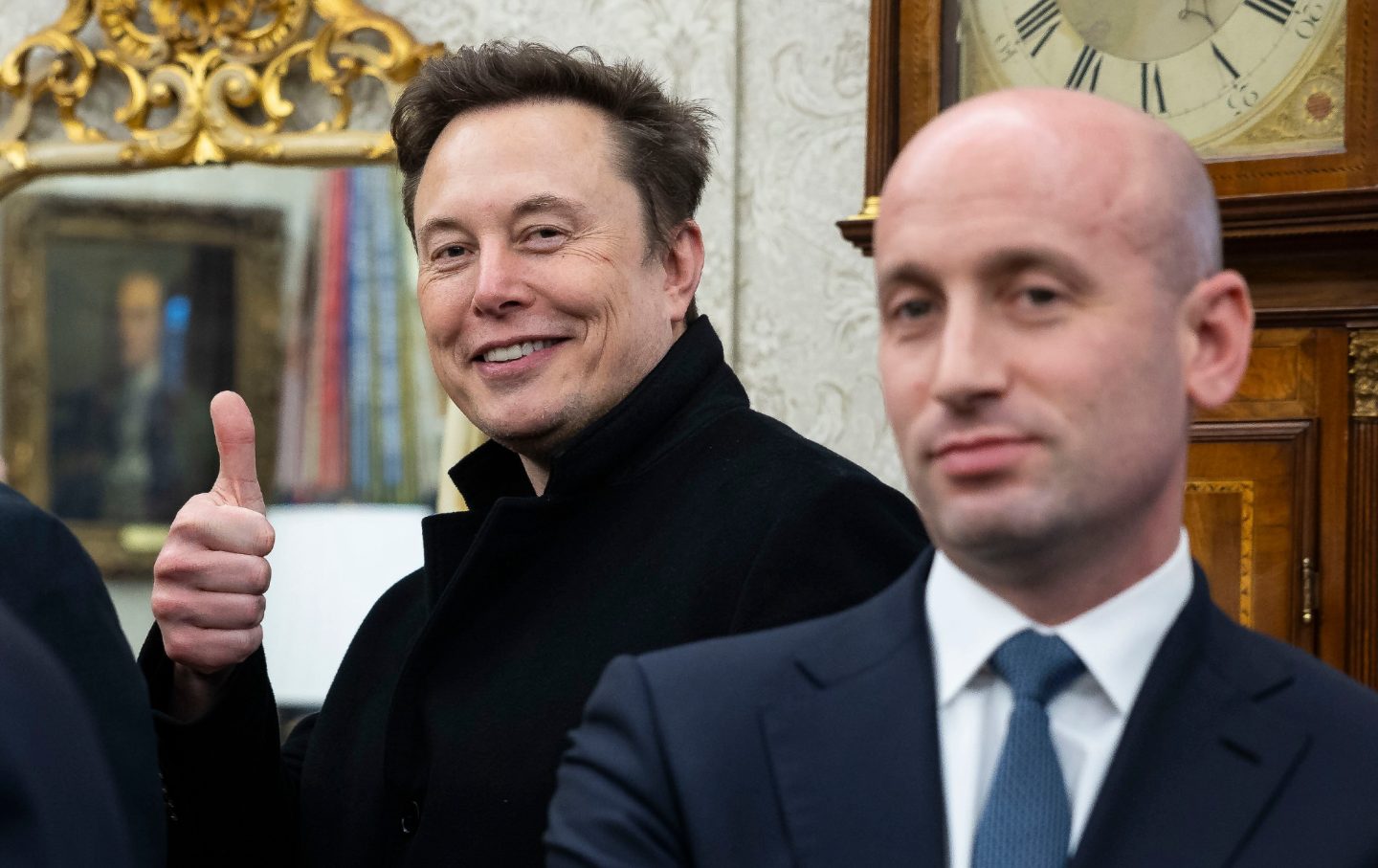Politics
/
September 30, 2025
The former hard-charging deputy attorney general succumbed to political hubris as FBI director, and discredited the federal justice system in the process.

Former FBI Director James Comey is sworn in via videoconference to testify before a 2020 Senate Judiciary hearing on federal investigations of the 2016 election.
(Ken Cedeno / UPI / Bloomberg via Getty Images)
It was August of 2005, and Jim Comey was delivering a memorable and heartfelt speech in the Department of Justice’s historic Great Hall as he stepped down from his position as deputy attorney general (DAG). Comey compared his obligations as DAG with ensuring that a pond was filled with water—the water, filled to the brim, representing the reservoir of trust the American people had in the DOJ. It was his hope, he said as he finished his speech, that his tenure as DAG had not let any water or trust dissipate from that pond.
Those words struck a chord with me and my colleagues attending the event. Comey’s steady hand had helped transform the department’s ability to respond effectively to terrorism in the wake of the 9/11 attacks; he also strengthened the ability of federal prosecutors like me to respond to the post-Enron accounting fraud scandals. Most important, despite these cataclysmic episodes, unique in our history, Comey helped to bolster the DOJ’s reputation for responding to and addressing any manner of national crisis. In short, the DOJ under Comey, I believe, had met the moment. What was beginning to change, however, was politics, and the way it slowly infected the department’s ability to effectively respond to a crisis.
Now the 20 years that have passed since Comey’s passionate defense of the DOJ’s reputation for robust nonpartisan action seems more like an epoch. Today that same James Comey who had extolled and defended the ideal of equal justice during his time at the DOJ finds himself the object of a grotesque and unfounded abuse of the law as a cudgel to punish political opponents. Last week, he was served a flimsy indictment handed down from an inexperienced and handpicked Trump flunky, Lindsey Halligan, following the president’s abrupt dismissal of her predecessor, who had insisted, correctly, that there were no credible charges to be brought against Comey. The impact of this Mob-like model of prosecution is likely to spread far beyond Comey and other public servants targeted for revenge by the Trump White House.
How exactly did Comey become the poster child for all that’s wrong with the Trump administration’s dismantling of the pillars of democracy? The through line is not that difficult to decipher—though an ironic twist is the active role Comey himself played in his later law enforcement career in dismantling the norms that had been considered vital to an ordered constitutional democracy.
By the time Comey was nominated as FBI director by President Barack Obama in September of 2013, the DOJ had had a particularly bad run and was far less stable than when he had departed. First, starting in 2006, DOJ leaders failed to allow the prosecution of Purdue Pharma and the Sackler family for the criminal conduct that enabled and fortified the opioid epidemic that would come to addict, kill and ravage generations of Americans. Then, post-2009, Obama’s DOJ honchos had punted on prioritizing the prosecution of the myriad Wall Street financial institutions and their executives for the egregious role they played in the predatory lending and valuation schemes that eviscerated the bank accounts and financial stability of tens of millions of Americans during the great financial crises. Festering top-down incompetence and political rot seemed to have permanently infected the upper echelons of DOJ’s appointed elite. Oblivious to the pent-up fury of middle America toward government impunity, incompetence and intransigence that was reaching a boiling point, DOJ’s leadership maintained its spineless status quo as Americans continued seething.
Now, as director of the FBI, Comey would be tasked with investigating a broad swath of domestic and international criminal activity alongside a DOJ that many Americans now viewed as unprepared and unwilling to handle such a task. Comey, keenly aware of the DOJ’s recently gutless performance, would have appreciated the challenge. Plainly, his institutional reputation and massive ego would be put to the test.
Current Issue

But Comey faced—and failed—a very different sort of test, via the presidential candidacy of Hillary Clinton. In early March of 2015— just three months before Trump would descend his golden escalator to announce his own candidacy—The New York Times reported that Clinton had used a private e-mail server to communicate government business while serving as secretary of state. Some 300 examples of these irregular communiqués had surfaced as part of the evidence turned over to the House committee investigating the Benghazi consulate attacks. Of course, an FBI investigation would ensue. The table was now set for a political investigation that would require the level of deftness and rigid adherence to DOJ policy necessary to ensure public acceptance of whatever the outcome proved to be. Comey seemed to possess the perfect combination of experience and gravitas to lead such a high-stakes operation—but he would falter badly.
The FBI’s investigation soon revealed that of the more than 30,000 government e-mails sent on Clinton’s private server, only eight contained top secret information at the time they were sent (though they were apparently not marked as such). An important stipulation here, frequently overlooked in the breathless media coverage of the episode, was that none of those eight messages contained imminent war plans.
In July of 2016, Comey, without notifying his boss, Attorney General Loretta Lynch, announced that he was wrapping up the FBI’s investigation because none of its findings indicated that Clinton possessed criminal intent. This conclusion was inarguably correct, but the problem was that Comey had unilaterally elected to bypass well-established DOJ policy to make the announcement himself rather than first notifying his boss. Comey’s grandstanding earned him a rebuke from the DOJ’s inspector general—but its more crucial legacy proved to be his reversal of DOJ norms under what seemed a naked political calculation.
Comey lent a decidedly political subtext to the FBI’s findings in his midsummer press conference, delivering a scathing assessment of Clinton’s conduct as “extremely careless.” This, too, violated the DOJ’s important due-process guardrails against gratuitously impugning the character of uncharged individuals—another departmental norm that did not seem to matter to Comey, who seemed simply to overlook Clinton’s status as a presidential candidate. By casting aside these DOJ norms, Comey appeared to be placing the DOJ’s thumb on the scale of a presidential race.
And as it happened, he was only getting started. On October 28, 2016, 11 days before the presidential election, over the objection of career DOJ prosecutors, Comey notified Congress that he was reopening the Clinton e-mail investigation, as the FBI purportedly had located more e-mails on a seized a laptop belonging to disgraced former New York Representative Anthony Weiner, who was then married to close Clinton adviser Huma Abedin.
There was no precedent for this public announcement, and it was plainly prohibited by DOJ rules. It seemed that Comey’s hubris and fear that the renewed “investigation” would be exposed by rebel agents provoked him to pursue this disastrous and legally absurd course of action. Then, just two days before the election—after most of the early voting had been completed across the country—Comey closed the investigation again after revealing that the new e-mails, now reviewed, provided no evidence implicating Clinton in any wrongdoing. But the damage was done, as Trump proceeded to win the election without a majority of the popular vote. Comey was now America’s most vilified law enforcement officer on both the right and the left.
And the FBI had forfeited the public trust he had so assiduously cultivated at the DOJ, shunting aside critical legal norms, protocols and policies to advance what seemed to be a politically driven result. This perception only reinforced the general view that the DOJ, under prior administrations, had engaged in its own kind of lawfare and could not be trusted to do what was right.
Now with Halligan’s indictment, Comey finds himself on the other side of that sword. It’s true that Comey’s actions in the Clinton investigation were born out of neither vengeance nor retribution—yet his opportunistic dismissal of DOJ norms and guardrails has turned into a grimly symmetric, and far more troubling, brand of professional comeuppance. One would be tempted to call it a fitting final act in a Greek tragedy—only the engineers of Comey’s would-be undoing aren’t the gods on Olympus but the Trump quislings now in charge of federal law enforcement, keen to carry out any and all manner of prosecutorial vengeance upon Trump’s perceived enemies.
Popular
“swipe left below to view more authors”Swipe →
The recent Trump-instigated charges against Comey, and the staged criminal investigations against John Bolton, Adam Schiff, John Brennan, Letitia James and others, are all unconstitutional travesties of justice in their own right. They do, however, signal yet another front by the Trump administration in the dismantling of our constitutional democratic safeguards. We must do everything we can to stop these efforts.
Still, the destructive course Trump has undertaken was charted long before the last election; Attorney General Merrick Garland’s feckless dithering did little to stanch the public’s perception of the DOJ as a blunt tool of political retribution instead of a critical arm of the justice system operating in the public interest. However Comey’s indictment plays out in court, he must share some of the blame for the utter evaporation of the DOJ’s pool of trust.
Don’t let JD Vance silence our independent journalism
On September 15, Vice President JD Vance attacked The Nation while hosting The Charlie Kirk Show.
In a clip seen millions of times, Vance singled out The Nation in a dog whistle to his far-right followers. Predictably, a torrent of abuse followed.
Throughout our 160 years of publishing fierce, independent journalism, we’ve operated with the belief that dissent is the highest form of patriotism. We’ve been criticized by both Democratic and Republican officeholders—and we’re pleased that the White House is reading The Nation. As long as Vance is free to criticize us and we are free to criticize him, the American experiment will continue as it should.
To correct the record on Vance’s false claims about the source of our funding: The Nation is proudly reader-supported by progressives like you who support independent journalism and won’t be intimidated by those in power.
Vance and Trump administration officials also laid out their plans for widespread repression against progressive groups. Instead of calling for national healing, the administration is using Kirk’s death as pretext for a concerted attack on Trump’s enemies on the left.
Now we know The Nation is front and center on their minds.
Your support today will make our critical work possible in the months and years ahead. If you believe in the First Amendment right to maintain a free and independent press, please donate today.
With gratitude,
Bhaskar Sunkara
President, The Nation
More from The Nation

Too easily dismissed as hyperbole, the Antifa myth is being used as a weapon to destroy domestic opposition.
Jeet Heer

They effectively control our fates, but deep down, they know they’re sniveling, pathetic, and inadequate, and it eats them up.
Katherine Krueger

Foreign bots were spewing much of the racist rhetoric that followed Charlie Kirk’s killing. And yet it gained traction only because there is plenty of homegrown racism to exploit….
Kali Holloway


